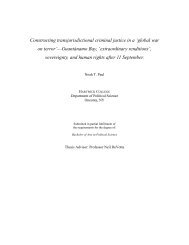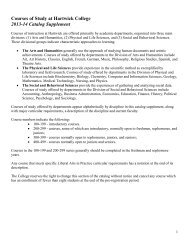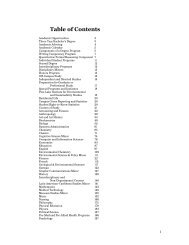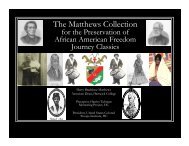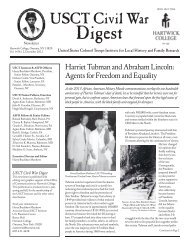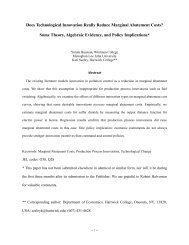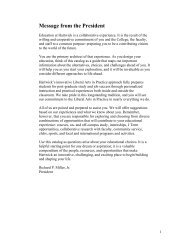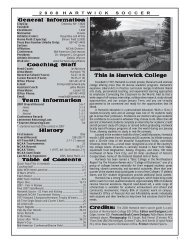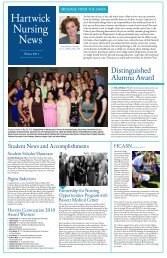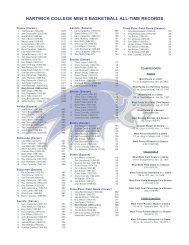Table of Contents - Hartwick College
Table of Contents - Hartwick College
Table of Contents - Hartwick College
You also want an ePaper? Increase the reach of your titles
YUMPU automatically turns print PDFs into web optimized ePapers that Google loves.
Classics<br />
In a future characterized by continuity with past cultural achievements<br />
and tradition, it is important to understand and appreciate the roots <strong>of</strong><br />
Western cultural tradition. The opportunity to analyze the contributions<br />
which the Greek and Roman peoples have made to this tradition is<br />
provided through the study <strong>of</strong> classics at <strong>Hartwick</strong>.<br />
In order that students may appreciate the breadth and influence <strong>of</strong> these<br />
two cultures, the classics course <strong>of</strong>ferings at <strong>Hartwick</strong> embrace a number<br />
<strong>of</strong> disciplinary areas—language, history, literature, mythology, art, and<br />
philosophy. The contributions <strong>of</strong> these cultures to a wide range <strong>of</strong><br />
disciplines make study in classics an especially worthwhile component <strong>of</strong><br />
a liberal arts and sciences education, and students majoring in a variety <strong>of</strong><br />
disciplines will find such study relevant to their academic programs.<br />
Courses in classics are <strong>of</strong>fered through the Department <strong>of</strong> Modern and<br />
Classical Languages. Students who wish to major in the field <strong>of</strong> classics, or<br />
to develop a concentration in the discipline in combination with some<br />
other area <strong>of</strong> study, may do so under the Individual Student Program<br />
option in consultation with faculty in the department. (See page 9 for<br />
information on Individual Student Programs.) While the selection <strong>of</strong><br />
courses depends upon the student’s interests and direction <strong>of</strong> study, a<br />
concentration in Greek and Roman studies would ordinarily include work<br />
in the language, history, literature and culture <strong>of</strong> the area.<br />
On-campus study is complemented by educational study tours <strong>of</strong> Greece<br />
and Rome <strong>of</strong>fered periodically by the department during January Term.<br />
These <strong>of</strong>f-campus programs focus on significant works <strong>of</strong> ancient art and<br />
archaeological remains in order to deepen students’ understanding <strong>of</strong><br />
ancient history, literature and culture acquired in the classroom.<br />
In addition to the courses listed in this section, the following related<br />
courses are described elsewhere in the catalog:<br />
English:<br />
220 Western Literature (Engl)<br />
320 Classical Theatre & Drama (Engl)<br />
History:<br />
207 History <strong>of</strong> Ancient Greece (Hist)<br />
208 History <strong>of</strong> Republican and Imperial Rome (Hist)<br />
Philosophy:<br />
281 Ancient Philosophy (Phil)<br />
Political Science:<br />
227 Justice and Virtue: Classical Political Ideas (Posc)<br />
Faculty<br />
Part-Time Faculty: Nancy Macdonald<br />
Courses<br />
205 Seminar in Greek Civilization (3 credits) An introduction to the<br />
art and archaeology <strong>of</strong> ancient Greece through a survey <strong>of</strong> the major<br />
79



